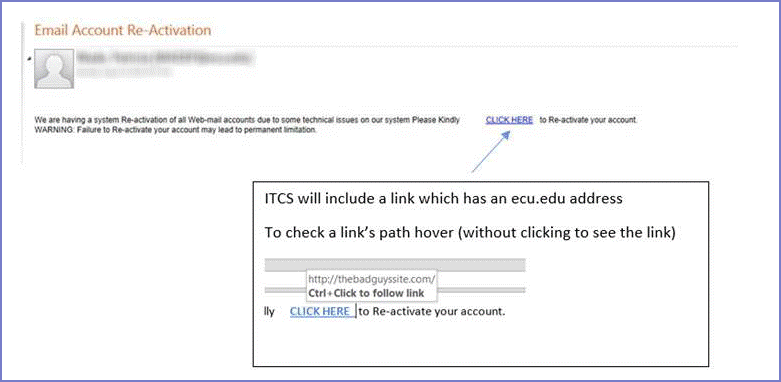Malicious Email

You have clicked a link identified as malicious
Please take a moment to read the tips below to keep your identity safe.
ECU uses data from the Cisco Talos IP and Domain Reputation Center to determine websites that are a security threat.
To see why this site is considered malicious and your access blocked on the ECU network, enter the URL into the Talos File Reputation Disposition Search box.
Even the best spam filter misses an occasional scam. However, if you can spot the difference between official and fake, you become the BEST defense in keeping your data safe and the ECU network secure.
Most bogus emails look real, but there are differences between an official message from ECU and one trying to trick you to give up a password. See below and learn to spot the difference.
EXAMPLE – the non-specific link
Messages from ITCS always contain spelled-out links with the ecu.edu address. Always mouse over or listen to (if listening through a screen reader) the complete link to check the real URL.
The example below shows a CLICK HERE link with no identifying information.
Never click a non-specific link within an email

EXAMPLE – official ECU messages
Official messages from ECU/ITCS include your information, such as a PirateID. Also, links are spelled out. If you mouse over these links, the URL includes ecu.edu.
You will also see a message at the bottom including how you can find an official announcement on the ITCS website.
Official messages contain your PirateID and other specific information

Follow these tips to avoid becoming a victim
While ITCS does a good job catching most malicious messages before they are delivered, some do get through, so we count on our users to be aware of the following to avoid being a victim:
- NEVER reveal your password to anyone.
- Legitimate businesses-including ECU, banks, the IRS-will NEVER request personal information through an email message.
- If an email asks for personal information, DELETE it.
- If you’re unsure about an email, call the business using the phone number on the back of the bill, statement or credit card-not any phone number listed in the email.
- Email alerts from ECU will always originate from ITCS Notifications.
- If you have provided account information to a malicious site, change your password immediately at pirateid.ecu.edu/.
- Never click the links in an email.
- Use antivirus and antispyware software as well as a firewall and update them regularly.
- Keep your operating system and other software up to date with the latest security patches and updates.
- Report spam on the email spam filter page.
- Forward suspected phishing emails to phish@ecu.edu.
Need help? Call the IT Service Desk at 252-328-9866 | 800-340-7081 or submit a network support request.